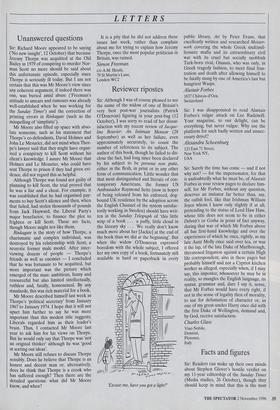Unanswered questions
Sir: Richard Moore appeared to be saying (`No new insight', 12 October) that because Jeremy Thorpe was acquitted at the Old Bailey in 1979 of conspiring to murder Nor- man Scott no more should be said about this unfortunate episode, especially since Thorpe is seriously ill today. But I am not certain that this was Mr Moore's view since any coherent argument, if indeed there was one, was buried amid abuse (`Freeman's attitude to smears and rumours was already well-established when he was working for the Sunday Times') and the correction of printing errors in Rinkagate (such as the misspelling of `simplistic').
Mr Moore also filled up space with abso- lute nonsense, such as his statement that Thorpe's co-defendants, David Holmes and John Le Mesurier, did not mind when Thor- pe's lawyer said that they might have organ- ised a conspiracy to kill Scott without his client's knowledge. I assure Mr Moore that Holmes and Le Mesurier, who could have sent Thorpe to prison if they had given evi- dence, did not regard this as helpful.
Although Thorpe was found not guilty of planning to kill Scott, the trial proved that he was a liar and a cheat. For example, it was established that he had organised pay- ments to buy Scott's silence and then, when that failed, had stolen thousands of pounds from Jack Hayward, the Liberal Party's major benefactor, to finance the plot to frighten or kill Scott. These are facts, though Moore might not like them.
Rinkagate is the story of how Thorpe, a charismatic and complex individual, was destroyed by his relationship with Scott, a neurotic former male model. After inter- viewing dozens of people — Thorpe's friends as well as enemies — I concluded that he was fortunate to be acquitted, but more important was the picture which emerged of the man: ambitious, funny and resourceful but also limited intellectually, ruthless and, fatally, homosexual. By any standards, this was rich material for a book.
Mr Moore described himself last week as Thorpe's 'political secretary' from January 1967 to January 1974. I hope that it will not upset him further to say he was more important than this modest title suggests; Liberals regarded him as their leader's brain. Thus, I contacted Mr Moore last year to ask him for his views on Thorpe. But he would only say that Thorpe was 'not an original thinker' although he was 'good at sorting out ideas'.
Mr Moore still refuses to discuss Thorpe sensibly. Does he believe that Thorpe is an honest and decent man or, alternatively, does he think that Thorpe is a crook who has suffered enough? Then there are the detailed questions: what did Mr Moore know, and when? It is a pity that he did not address these issues last week, rather than complain about me for trying to explain how Jeremy Thorpe, once the most popular politician in Britain, was ruined.
Simon Freeman c/o A.M. Heath,
79 St Martin's Lane, London WC2


















































































 Previous page
Previous page